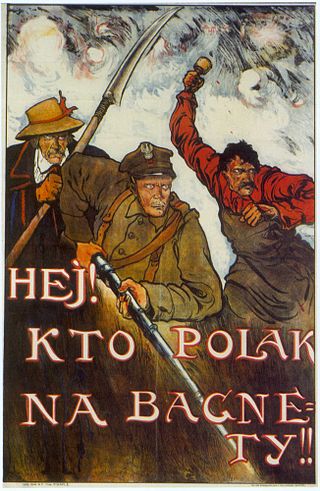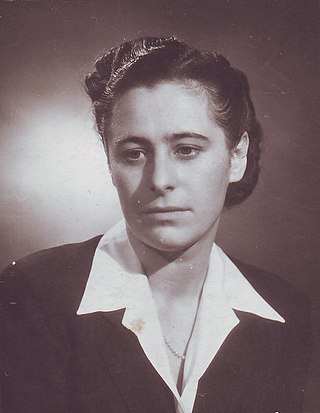
In various East Asian languages such as Mandarin Chinese, Japanese, Korean, and Vietnamese, the phrase "Wànsuì", "Banzai", "Manse", and "Vạn tuế", respectively, meaning "myriad years" is used to wish long life, and is typically translated as "Long live" in English. The phrase originated in ancient China as an expression used to wish long life to the emperor. Due to the historical political and cultural influence of Chinese culture on the East Asian cultural sphere, in the area, and in particular of the Classical Chinese language, cognates with similar meanings and usage patterns have appeared in many East Asian languages and Vietnamese. In some countries, this phrase is mundanely used when expressing feeling of triumph, typically shouted by crowds.

"Warszawianka 1831 roku", "La Varsovienne" is a Polish patriotic song written by Casimir François Delavigne with music by Karol Kurpiński.

Viva, vive, and vivat are interjections used in the Romance languages. Viva in Spanish, Portuguese, and Italian, Vive in French, and Vivat in Latin are subjunctive forms of the verb "to live." Being the third-person, subjunctive present conjugation, the terms express a hope on the part of the speaker that another should live. Thus, they mean "(may) he/she/it/they live!" and are usually translated to English as "long live."

Jerzy Oskar Stuhr was a Polish film and theatre actor. Considered one of the most popular, influential and versatile Polish actors and an icon of Polish cinema, he also worked as a screenwriter, film director, voice actor and drama professor. He served as the rector of the Ludwik Solski Academy for the Dramatic Arts in Kraków for two terms: from 1990 to 1996 and again from 2002 to 2008.

Edyta Anna Górniak is a Polish pop singer. Górniak started as a musical theatre actress in 1990. She performed in the most popular musical in Polish history, the Tony Award-nominated Metro. Some of its shows took place on Broadway. Górniak was Poland's first representative in the Eurovision Song Contest in 1994 with the song "To nie ja". She placed second which still remains the country's best result at the competition. This started her decades-long career as a pop singer in her native country and internationally. She is also known for her 1997 single "One and One". She is the recipient of the Bronze Medal for Merit to Culture – Gloria Artis for her contributions to the arts.
The grammar of the Polish language is complex and characterized by a high degree of inflection, and has relatively free word order, although the dominant arrangement is subject–verb–object (SVO). There commonly are no articles, and there is frequent dropping of subject pronouns. Distinctive features include the different treatment of masculine personal nouns in the plural, and the complex grammar of numerals and quantifiers.

Maria Antonina Rodowicz, known professionally as Maryla Rodowicz,, is a Polish singer, guitarist and actress.

Anna Jantar-Kukulska was a Polish singer and the mother of singer Natalia Kukulska. She is considered an icon of Polish pop music, and also one of the most famous Polish singers of the 1970s.

Irena Wanda Jarocka, was a Polish singer.

The Best Polish Songs... Ever! is a compilation released by EMI in late 2007. Generally, it has been released for Poles who live abroad and for Polish music fans.

Józef Kowalski was a Polish supercentenarian claimant, who was the last surviving military veteran of the Polish-Soviet War.
Murzyn is a common Polish word, for a Black person of Sub-Saharan African descent, cognate with the English word "Moor". Since the 21st century, some Black people residing in Poland consider it offensive.

Zofia Chądzyńska or Sophie Bohdan, was a Polish writer and translator of the Iberoamerican literature. Her first book was published in French under a pseudonym of Sophie Bohdan, entitled "Comme l'ombre qui passe", Publisher: Paris : Calmann-Lévy, 1960. Later she was publishing in Polish under her original name Zofia Chądzyńska.
Mnohaya lita is a traditional Ukrainian celebratory song. The song is based on both the Greek: Εις πολλά έτη Eis polla etē and on the Byzantine Rite polychronion or the hierarchical acclamation Ton Despotin, which is normally sung at the end of church services. The song is also sung at informal gatherings and at formal events, such as weddings, church events or other celebrations.

Piotr Cugowski is a Polish musician, vocalist of the Bracia Group, which he founded together with his brother Wojciech. He comes from a musical family, being the son of Krzysztof Cugowski, who is the founder of a well known Polish 1970's rock band Budka Suflera. Piotr Cugowski is a member of the Polish Society of the Phonographic Industry.
Events in the year 2022 in Poland.

Tomasz Knapik was a Polish film, radio and television voice-over translation artist. He held a doctorate in electrical engineering and also served as a lecturer at the Faculty of Transport of the Warsaw University of Technology. He was widely regarded as a legend in the field of voice-over translation in Poland.

The Sowa Company is a family-run patisserie firm created in 1946, in Bydgoszcz, Poland. In May 2022, the enterprise had 160 shops and selling points in Poland, Germany (Berlin) and England (London).

Ernest Włodzimierz Bryll was a Polish poet, writer, songwriter, journalist, translator, film critic and diplomat.

Anna Małgorzata Szałapak was a Polish ethnographer, ethnologist, singer, and performer of sung poetry, particularly at the Piwnica pod Baranami literary cabaret in Kraków.















